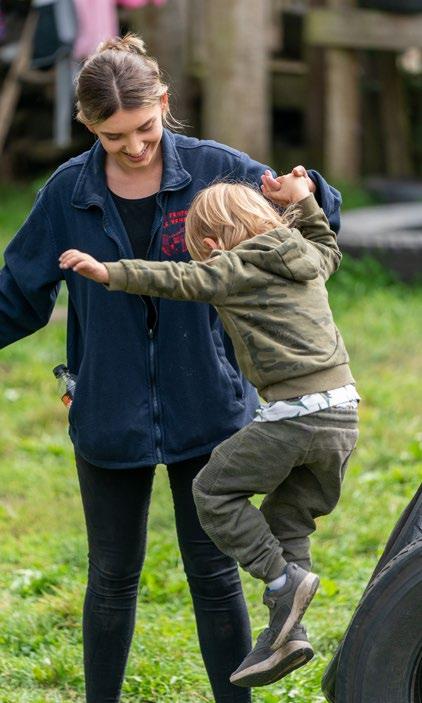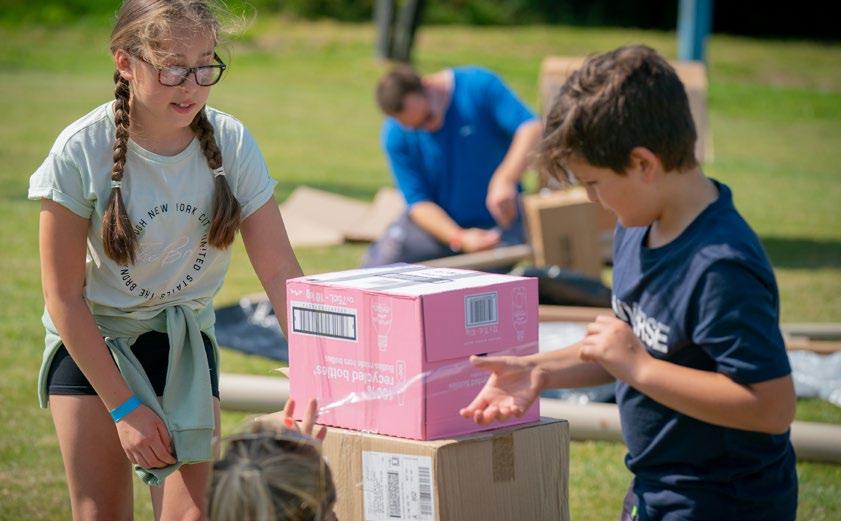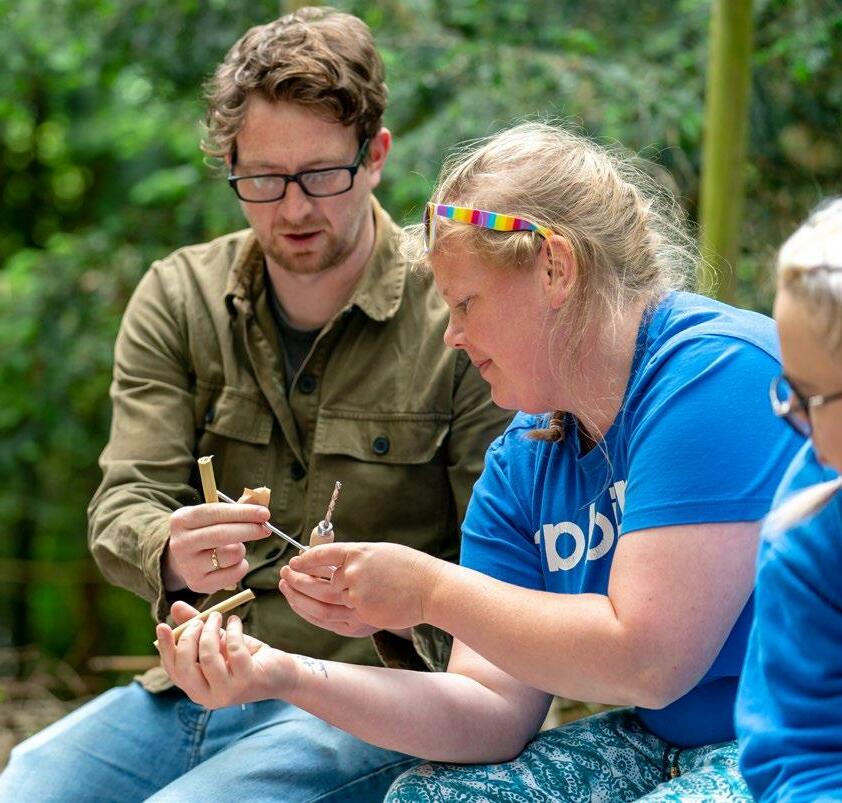Playwork qualifications in Wales
For playworkers and others who work with children




For playworkers and others who work with children



A short guide to help playworkers, employers and managers better understand the playwork qualifications available in Wales.
The playwork sector is varied and there are lots of different types of professionals that need playwork qualifications. There are a few different options available if you need a playwork qualification as part of your work.
This guide has been developed to help you understand the option that is right for you.
These options vary depending on:
What your job role is
Whether the setting you work in is regulated and inspected by Care Inspectorate Wales (CIW)
In what type of setting you work
What other qualifications you hold – particularly if they are in childcare, youth work or education.
Playwork might best be understood as the art of working with playing children. Playwork is child-centred and tries to ensure that play is the central concern of the adult-child relationship.
This requires a range of skills that you will learn about on any of the playwork qualifications described in this guide.
•
A belief that children are the experts when it comes to their play
•
A willingness to step back when necessary so children can play in their own way
•
An awareness that risk taking is an important part of play and that the role of adults is to balance risk taking with the physical and emotional benefits
•
An appreciation of the value of observation and how this helps with understanding children and their play
•
An ability to reflect on good and bad experiences to improve playwork practice
•
A belief that children have a right to play
•
A creative approach to working with others
•
A commitment to the inclusion of all children
•
A willingness to let children take the lead
•
A good understanding of how to provide resources for play.
It is important to know that playwork qualificiations can also be valuable for anyone working with children.
Playwork jobs may be full or part-time and are sometimes just available during school holidays. This means that playwork can be a full-time career or something that fits around study or other work.
Understanding how to support children to play is the most important job for a playworker. This makes it different to many other professions that work with children whose main focus may be on learning, physical activity or arts.

Playworkers work to the Playwork Principles which establish a professional and ethical framework for playwork.
Find out more about the Playwork Principles at: www.playwales.org.uk/eng/playworkprinciples
Playworkers may work in a range of different places, including:
• Staffed adventure playgrounds
• After school clubs (out of school childcare)
• Holiday playschemes
• Schools
• Doorstep play projects – such as street play
• Play ranger projects – such as in public parks.
The Playwork: Principles into Practice (P3) progression route is made up of three qualifications.
Starting as an unqualified playworker, completion of all three qualifications will allow you to work as a senior playworker or playwork manager. Each part of the progression route builds on the knowledge and skills gained in the qualification before.
The qualifications have been designed to provide an effective progression route for playworkers to become qualified:
1. The Agored Cymru Level 2 Award in Playwork Practice (L2APP) provides a broad introduction to playwork and is the entry requirement to progress on to the other qualifications in the series.
2. The Agored Cymru Level 2 Certificate Playwork: Principles into Practice has been designed to meet the requirements of face to face playworkers working year-round in a range of settings. It includes information about reflective practice, safeguarding, working with others and practical playwork skills.
3. The Agored Cymru Level 3 Diploma Playwork: Principles into Practice is the progression from the Level 2 Certificate and is aimed at playwork managers and supervisors. It includes information about community development, risk management, legislation and working with families.
www.playwales.org.uk/eng/qualifications
The P3 progression route is special because:
• It is truly play centred training where the needs of playing children come first.
• Inclusive playwork and meeting the play needs of all children are embedded throughout the courses.
• The learning experience is a dynamic interactive one that ensures learners will find it interesting and stimulating.
• Learners and employers tell us it transforms their practice.
• It is structured around the Playwork Principles.
• It is delivered by some of the most dynamic, inspirational playwork trainers in the UK.
• The course materials have been written, designed and edited by some of the UK’s leading playwork experts.
• It can be delivered in English or Welsh (including handbooks).

In addition to the P3 progression route there are other playwork qualifications available. These may be suitable for those with other qualifications in working with children. They may also be good if you just want an introduction to play and playwork.
Part of the P3 progression route but it is also good as an introduction. If you work in schools, youth work, sports, early years or other settings with children, it has been designed to help you.
For people with another level 3 qualification in working with children. It has been developed mainly to help people in holiday playschemes to add playwork knowledge and skills to their existing qualification.
A train the trainer course for playwork tutors. It is also the minimum that Play Wales expects of tutors delivering the P3 progression route.
For people with another level 3 qualification in working with children, particularly those with education, youth work or care qualifications. This qualification can be added to your existing qualifications to cover the knowledge and skills for playwork in settings that are registered with Care Inspectorate Wales. It is offered by several awarding bodies including Agored Cymru, NCFE Cache and City & Guilds.
Level 2 and 3 playwork diplomas These qualifications are available from other awarding bodies including NCFE Cache and City & Guilds. They are recognised qualifications in Wales and are the only ones available as playwork apprenticeships. Apprenticeships can be a good way of getting funding to learn on the job.
To work in a setting that is regulated by Care Inspectorate Wales (CIW), you need to hold the appropriate qualifications for your job role.
• Playwork qualifications are needed for anyone working in a regulated setting with children of school age in an after school or open access setting.
• In some cases, this may mean that a playwork qualification as well as a childcare qualification is needed.
•
Those who work face to face with children, who are not managers, generally need to hold a level 2 qualification.
Your individual role and what other qualifications you already have will impact on which qualifications are most suitable for you. To help you decide on the best qualification for you, take a look at the flow chart available on Play Wales’ website.
More information about the List of Required Qualifications to work within the Playwork Sector in Wales is also available on the website.
•
Those who work as managers generally need to hold a level 3 qualification.
The qualifications that are needed are agreed by the Playwork Education and Training Council for Wales (PETC Wales).
Find out more about required qualifications at: www.playwales.org.uk/eng/requiredqualifications

The national organisation for children’s play. Play Wales has led on writing the playwork qualifications for the sector in Wales and can advise on the best qualification for you. www.playwales.org.uk
Play Wales’ lead delivery partner for qualifications. It is a Further Education (FE) college that provides courses and qualifications across Wales. www.adultlearning.wales
The national organisation that helps set up, develop and support out of school childcare clubs. It is a major provider of playwork qualifications and an important partner of Play Wales. www.clybiauplantcymru.org
The Playwork Education and Training Council for Wales (PETC Wales) approves which playwork qualifications are required for people working in regulated playwork settings. www.playwales.org.uk/eng/ petcwales
The independent organisation responsible for regulating qualifications in Wales. This includes qualifications gained at school (GCSEs and A-Levels) and vocational qualifications like playwork and childcare. www.qualificationswales.org
The body that is responsible for regulating and inspecting childcare and playwork settings. www.careinspectorate.wales
These are the organisations that award the qualifications. Ultimately, they are responsible for quality, content and design of qualifications – and your certificate! Play Wales has worked with Agored Cymru to develop the playwork progression route in this guide. Agored Cymru is a Welsh awarding body. You will also find playwork qualifications from other UK awarding bodies including NCFE Cache and City & Guilds.